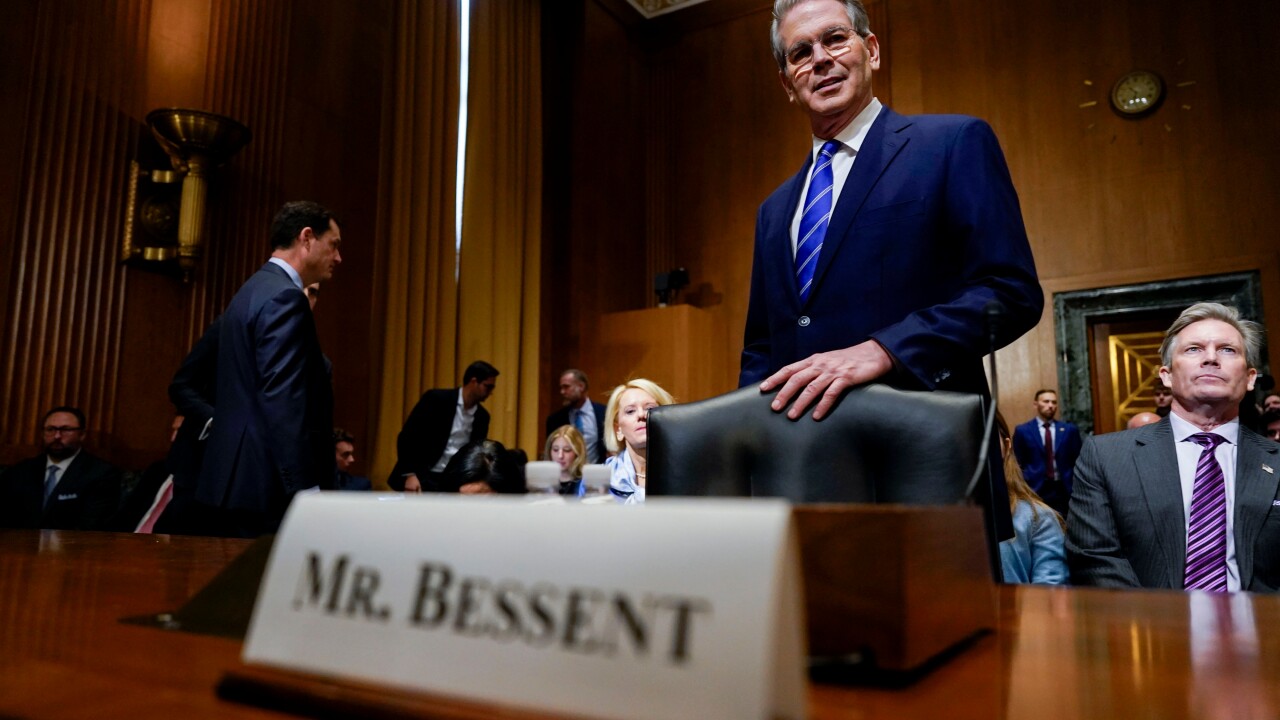-
The government-sponsored enterprises were not meant to remain in conservatorship permanently, but privatizing them once again must include a new set of rules that minimize market disruptions and maximize their focus on making homeownership affordable.
February 11 -
The Federal Reserve governor said regulators have stifled the banking system's ability to experiment with emerging technologies.
February 5 -
The president's rough-and-tumble trade negotiations have throttled financial markets, causing investors to flock to the safety of dollars and Treasuries. But some economists say this style of policymaking could have hurt the U.S.'s safe haven status in the long run.
February 4 -
Some mortgage stakeholders say Trump's tariffs would make interest rates rise and housing costs shoot up.
February 4 -
Treasury Secretary Scott Bessent, who was named to be acting director of the Consumer Financial Protection Bureau, has told the agency's staff to put a halt to all rules, enforcement actions and hiring.
February 3 -
The Consumer Financial Protection Bureau's Rohit Chopra in a letter to President Donald Trump confirmed that his "term as CFPB Director has concluded."
February 1 -
State banking associations across the country said that Michelle Bowman should be the Federal Reserve vice chair for supervision, not least because she already sits on the Fed board and could start immediately.
January 31 -
Russell Vought, should he be confirmed by the full Senate, would join a short list of those able to lead the CFPB, as his predecessor Mick Mulvaney did, per the requirements of the Vacancies Act.
January 30 -
Mortgage experts were expecting the first FOMC meeting under President Trump would have more significance in the long run than short-term, with some wild cards.
January 29 -
Experts say the Trump administration is waiting for Scott Bessent to be confirmed as treasury secretary and for other appointees to clear the Senate before naming acting heads at federal banking agencies.
January 24 -
Sunsetting the federal oversight of Fannie Mae and Freddie Mac could ease the cost of renewing President Trump's 2017 tax act, but doing so is an uphill battle.
January 21 -
A one-page outline of priorities for Trump's inauguration day obtained American Banker includes financial policy items, including firing Consumer Financial Protection Bureau Director Rohit Chopra, issuing a "reset" of that agency and designating crypto as a "national priority."
January 20 -
Scott Bessent, Donald Trump's pick to serve as Treasury Secretary, handled a policy-heavy confirmation hearing with poise, highlighting his preference for relaxed bank regulation, support of the 2017 Trump tax cuts and a hawkish approach to spending.
January 16 -
With the Federal Reserve touting a slower pace of easing, markets are expecting a longer pause. But Gov. Christopher Waller said the next interest rate reduction could come as soon as March because of inflation data.
January 16 -
The incoming Trump administration's 'agency review team' has landed and is expected to name an acting director of the Consumer Financial Protection Bureau. Republicans on the Federal Deposit Insurance Corp. or the Federal Trade Commission are among the most likely candidates.
January 15 -
The Consumer Financial Protection Bureau's research found that the majority of buy now/pay later users are subprime borrowers, holding high credit card balances and multiple loans, suggesting the offering is riskier to lenders than previously assumed.
January 13 -
A cohort of bank industry interest groups called for the incoming Trump administration to pause all pending bank regulation and litigation and extend the timelines for implementing final rules issued by the Biden administration.
January 13 -
In a speech outlining his priorities for the FDIC, Vice Chair Travis Hill stressed the need for a more flexible regulatory approach, addressing capital requirements, digital assets, climate policy, and bank oversight, while emphasizing transparency and timely action.
January 10 -
Seen by many as a logical pick for the Federal Reserve's next vice chair for supervision, Gov. Michelle Bowman wants the institution to focus on safety and soundness issues, tailoring and transparency.
January 9 -
The Consumer Financial Protection Bureau said it would undertake a rule to regulate large participants in the personal loan market and consider a joint rulemaking with the Federal Reserve on check and ATM hold times.
January 8

















